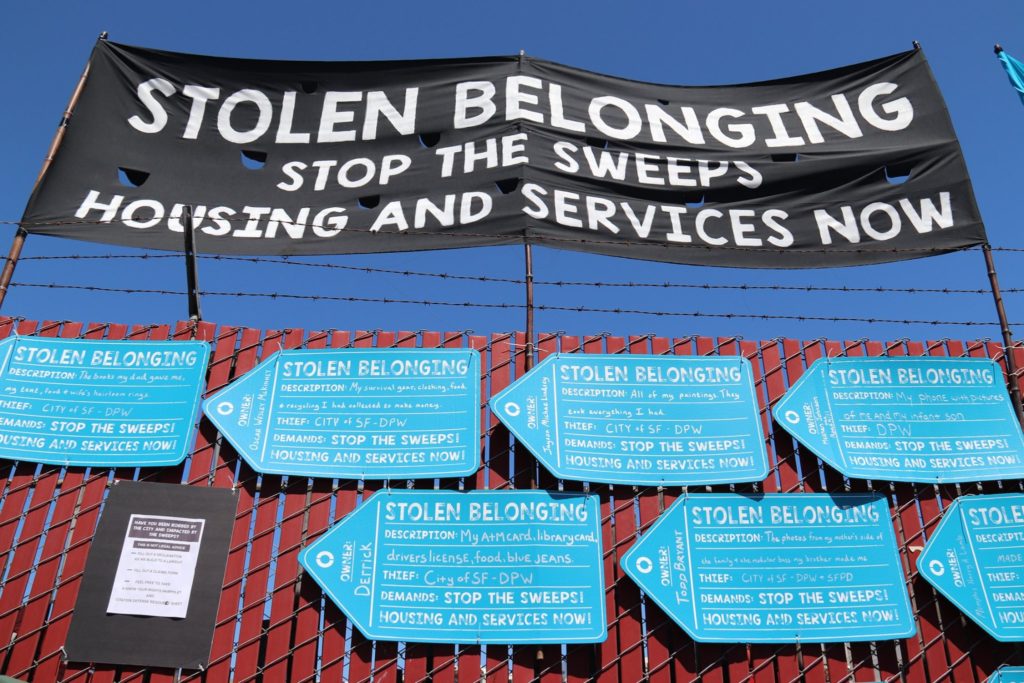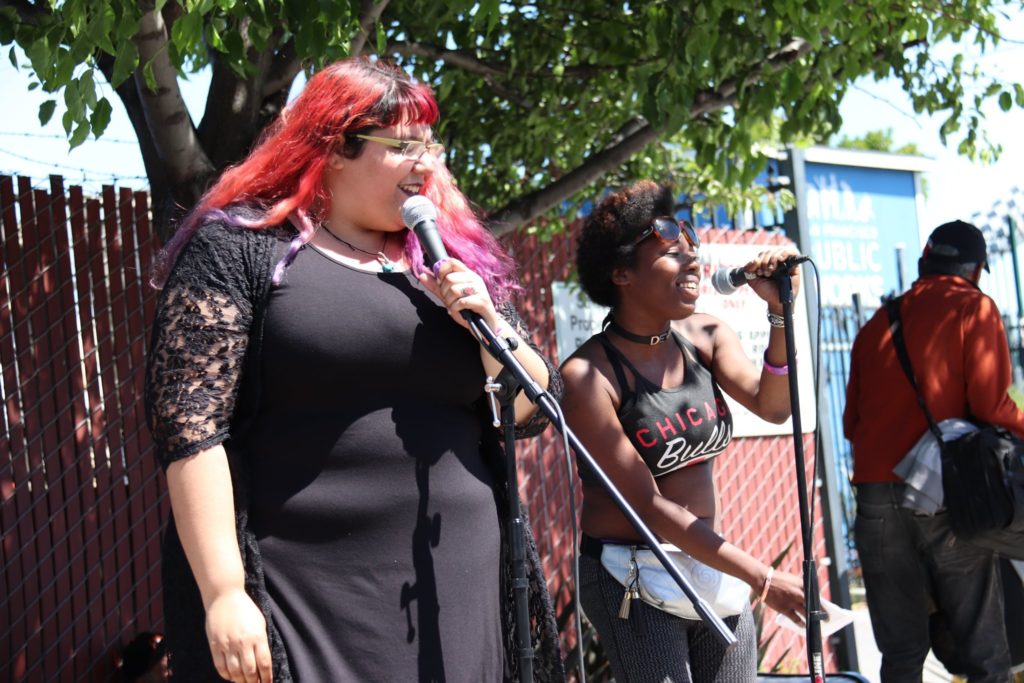The homeless property yard at the San Francisco Department of Public Works saw an unusually busy Saturday afternoon on June 22, more activity than the workers anticipated.
Eleven unhoused City residents — joined by about 100 supporters of unhoused people — attempted to reclaim property that Public Works crews seized during sweeps of outdoor encampments earlier this year to where it was supposedly stored.
Alton Perdew lost four backpacks containing such personal possessions as phones, electronic items and medication.
Heather Lee wanted back her ID, photos of her children and recent birthday presents inside a Pelican case and a big green wagon that Public Works took away, but the 90-day deadline to retrieve this property lapsed.
And Todd Bryant filled out three separate forms to reclaim items including bicycles and Husky bags filled with $600 worth of tools, as well as historically significant letters from his ancestors.
But like many other outdoor-dwelling residents before them who attempted to recover their stuff, they were left with nothing. Fortunately, those who showed up that day were provided with 40 care packages containing tents, sleeping bags, tarps and other survival items.
This was an example of how the department’s failure to restore impounded property violates its own “bag and tag” policy, homeless advocates say. More often than not, they add, it’s thrown away as trash or, if Public Works staff deems it valuable, sold on the street.
STOLEN BELONGING
The June 22 rally was more than just a protest against another heavy-handed tactic in the City’s approach to homelessness. The Stolen Belonging project organized the event as the culmination of a seven-month long project which included video interviews, public records requests, visual art displays, spoken word and the testimonies of sweep survivors themselves.
Housing activist and artist Leslie Dreyer organized the project to shine a light on a reality of living on the street — San Francisco’s recurring effort by multiple City agencies to disperse unsheltered people out of public view and dispose of the things they carry. Dreyer said these decisions come from high on the chain of command and must stop.
“The City of San Francisco is targeting houseless residents, stealing their survival gear, all of their belongings and, consequently, their ability to belong in the city,” she said. “These orders come from the top down, and lead decision makers need to hear our collective voices demanding they stop the sweeps, which are driving folks further into poverty. It’s time they focus on preventing homelessness by stopping evictions and investing in services and housing, not harassment!”

HOW THE PROJECT BEGAN
As early as 2016, the Coalition on Homelessness, which publishes Street Sheet, started scrutinizing Public Works’ seizure practices. Volunteer Scott Nelson requested the agency for records related to “bag and tags” conducted during sweeps when San Francisco hosted Super Bowl 50. At the same time city workers cleared hundreds of tents in a two-month period, they recorded only 19 “bag and tag” forms.
Two years later, in December 2018, Dreyer recruited a team of six currently and formerly unhoused people at the Coalition on Homelessness — including this writer — to interview some 40 sweeps survivors on video. What they documented were cases of theft: tents, sleeping bags, suitcases, backpacks, bicycles, family bibles, photos of loved ones, relatives’ cremated remains, all stolen.
As part of the double meaning behind the name “Stolen Belonging” suggests, the owners’ sense of inclusion in San Francisco was also robbed.
In addition to shooting over 900 minutes of footage, the team pored through dozens of Public Works property forms that noted what was taken, where and when. Each production team member was interviewed about the impact the project had on them. At the June 22 action, it also displayed its artistic side as several posters resembling department tags were displayed listing the owners’ names and their lost goods.
The project also released several videos, which can be viewed on its website stolenbelonging.org. One video followed unhoused resident Heather Lee through the Public Works facility as she was thwarted in her attempt to retrieve her wagon and Pelican case. She and production team member Couper Orona made it as far as the office before staff ordered them to wait outside the gate. A worker who promised to search for Lee’s stuff never returned, leaving Lee out in the rain for one hour.
“This is what they’ve been doing to everyone I’ve talked to, making them wait,” she said. “I don’t believe they have my possessions at all.”
THE CITY AS A THIEF
Of all the equipment taken in the sweeps, laborer Todd Bryant’s assortment was arguably the most eclectic, one which he said he can’t fully enumerate.
“I made a list of all the things they’ve taken that I could remember, but of course DPW took that, too,” he said.
As one video excerpt shows, Bryant watched helplessly while Public Works trashed his tools and other belongings as a row of police officers stood guard. In another interview months later, Bryant said he also lost a bass guitar, several bicycles and collections of coins and football cards. In addition, workers tossed out several letters dating from the 1800s by his great, great grandfather, Col. Walker McClure, who helped build the Old Lincoln Highway. But the item most likely to have sentimental value to Bryant was an iPad with his only videos of his late mother.
Oscar Wesley McKinney was also robbed of his family history: A brown, leatherbound bible that was passed through five generations also included his family tree. But according to McKinney, the City isn’t just satisfied with taking family heirlooms; it wants to violate his personal space, too.
“It’s our privacy, that’s what the City wants to take away from us,” he said. “People who live along a doorway or a sidewalk always cover their heads up with their sleeping bag. A lot of people say it’s light they do it for, other people say heat, but it’s actually discretion. It’s the one time of the day the world won’t look at you, and you’re not looking at the world. It might be a blanket over your head, it’s still your occupied space. I prefer a tent.”
PUBLIC RECORDS
Another public records request made this year yielded a sample of “bag and tag” orders from 2016 to 2019. The City has been logging more forms each year, from 60 in 2016 to 400 last year. Yet, the paperwork still reveals scant detail. The majority of the items were listed as “bags” without specifying their contents. The forms also show that backpacks, suitcases and bicycles were frequently plucked in the sweeps.
Although no mention of family bibles, relatives’ ashes or valuables were filed, the words “stolen from the yard” were written on 30 of these forms, probably an attempt to explain away the absence of belongings. Public Works director Mohammed Nuru denied to the media that any thefts from the yard was an inside job.
“It’s mostly street people” who break into the yard, he told the San Francisco Examiner.
But a former Public Works employee’s account refutes Nuru’s explanation. Wishing to remain anonymous, the ex-worker added that no one ever spelled out the policy governing homeless people’s property during his tenure. Instead, he was instructed to throw stuff onto the truck.
“I was never trained to see the policy and the rules and all that. They never told me to do none of that,” said the informant. “I just followed the boss’s commands what to do, so that was about it.”
He added that workers would sift through the seized items at the yard, disposing of tents and taking more valuable items, such as electronics, to sell at neighborhood flea markets.
“They just go to the big dumpster and start unloading it, and whatever looks good to them, they go sell it on the weekend and try to make money off of it,” he said.
“HOW DARE YOU?”
Such stories of misconduct by City workers toward unsheltered people outrage Couper Orona, a diasbled firefighter who has been unhoused for 13 years. In the Stolen Belonging project, she acted as a liaison to street dwellers who were interviewed. Her words to the City sound like a contemporary street version of Émile Zola’s famous “J’accuse” open letter.
“City of San Francisco, what you’re doing is some fucked-up shit,” she said. “You’re treating people like they’re nothing. Like, how dare you? What would your mama think about your behavior and acting like people don’t matter? Where does your heart go?”
The theft of makeshift shelter, medications and IDs wreaks enough havoc in unsheltered people’s lives, but Meghan “Roadkill” Johnson, a production team member, was reminded of how precious a keepsake could be to one’s well being. Until she found housing earlier this year, she spent eight years on the streets and in shelters. As Johnson collected stories for the project, memories of those years flooded.
“There’s been times people have been telling their stories, and I just wanted to cry because I felt their pain, you know? It was resurfacing again,” she said. “Something people were talking about our experiences where their shit was stolen by DPW and SFPD, from like years ago. And that pain is still there.”

Team member Sophia Thibodeaux was also impacted by the project experience. Currently unhoused with two children, she was affected by the tales she heard.
“Even though they’re knocked down, these people still have strength to tell their stories and what happened,” she said. “Even though they don’t see it, they’re strong people. They inspire me by just telling their stories.”
###
ABOUT STOLEN BELONGING/PERSONAL DISCLOSURE
From December 2018 to June 2019, the author of this article participated in Stolen Belonging, a multifaceted arts organizing project which documents the belongings taken from homeless residents during the sweeps, revealing the ways in which such thefts steal a person’s ability to belong to their community and the city. The project’s primary demand is to STOP THE SWEEPS. On May 22, 2019, Stolen Belonging started releasing videos on its website stolenbelonging.org, which the project urges people to visit for more information and how to take action.
The project was made possible through a grant from the San Francisco Arts Commission.

